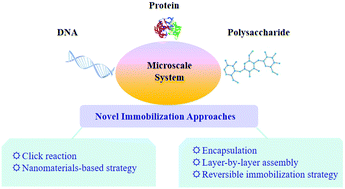Novel approaches for biomolecule immobilization in microscale systems
Abstract
Biomolecule-immobilized microscale systems present promising potential in the analysis field based on their reduced reagent consumption, improved analysis speed, automated processing, and high throughput. To increase the biomolecule binding capacity, improve the biomolecule activity and stability, enhance renewability, and develop easy-to-operate procedures, novel immobilization approaches have attracted tremendous attention recently. In this review, a variety of methods employed in preparing state-of-the-art DNA-, protein-, and polysaccharide-immobilized microscale systems are summarized. We focus on highlighting the merits of applying the click reaction, the nanomaterial-based strategy, encapsulation, layer-by-layer assembly, and the reversible immobilization strategy for improving the biomolecule-immobilized microscale system performance. Moreover, the utilization of innovative biomolecule-immobilized microscale systems for biosensing, affinity chromatography separation, bioreaction, and enantioseparation is also discussed.

- This article is part of the themed collection: Recent Review Articles


 Please wait while we load your content...
Please wait while we load your content...